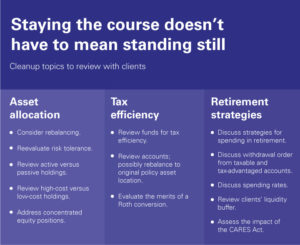
Not even Hollywood writers could have created a story like we lived out in 2020. In this video, Charlie Mattingly and one of Leading Edge’s newest advisors, Rob Eklund, discuss what this year has taught us, how to better prepare in the future, and thoughts about the markets and economy going forward.
Leading Edge financial advisor Rob Eklund, a First Officer for a major airline and a retired Air Force Pilot, review what investors can learn from mission planning in the Air Force and airlines. For example, how can we be proactive instead of reactive? Many times, people may remark how pilots need quick reactions to be successful. As Rob and I know, if you are frequently reacting as a pilot, it’s a good indication you did not plan sufficiently. We believe it’s the same with investing and retirement planning.
Although, it is to prepare prior to a recession or market downturn, there are many things we can do during the event itself. Vanguard posted the following graphic listing just a few of the value-added strategies that are critical to consider during any market decline.

In addition to the checklist above from Vanguard, we believe there are ten essential principles to help all of us remained focused and less stressed during the next market downturn or recession.
In the short term, the stock market reflects investor phycology (and many other unpredictable factors). However, over time, equity prices tend to represent the future cash flows of a business. We can all share in those future profits if we have the discipline to remain invested.
Although there is some debate within the finance community on the exact level of impact on investment returns, most will agree that strategic asset allocation and the amount of time in the market (not market timing) have the most considerable influence on investor returns.
Do not select investments based on past returns. Funds that have outperformed in the past do not always persist as winners in the future. Past performance alone provides little insight into a mutual fund or ETFs ability to outperform in the future.
The financial markets have historically rewarded long-term investors. We have the opportunity to earn an investment return that outpaces inflation by supplying capital to the companies we invest in. (I.e., stocks, mutual funds, exchange-traded funds)
Evidence shows that buying investments at a fair price (value factor), buying companies that demonstrate a consistent trend of profitability (profitability factor), and companies that tend to be smaller (small-cap premium) point to differences in expected future returns.
Diversification helps reduce risks that have no expected return. Global diversification can prove beneficial over the long term while reducing the short-term volatility of a portfolio.
You never know which market segments will outperform from year to year. Time in the market is much more profitable than attempting to time the market.
It’s challenging to differentiate the short-term ups and downs of the market from the long-term returns needed to outpace inflation. In reality, the most significant risk we face is losing purchasing power over the long-term, during retirement, versus the risk of short-term losses in the market.
There will ALWAYS be a news headline that could prevent you from investing in the stock market. The news headlines will either attempt to scare you out of the markets or lure you into the latest investing trend. Either strategy increases viewership, which in turn sells more commercials.
As we mentioned at the beginning of the article, just like pilots plan for their missions in great detail, we believe thorough planning is the best way to ensure a successful investing experience plus a fulfilling and prosperous retirement.
Please don’t hesitate to call or email us anytime. We’d love to hear from you!
Charlie Mattingly
Charlie@leadingedgefinancialplanning.com
865-240-2292
Please remember that past performance may not be indicative of future results. Different types of investments involve varying degrees of risk and there can be no assurance that the future performance of any specific investment, investment strategy, or product made reference to directly or indirectly in this video will be profitable, equal any corresponding indicated historical performance level(s), or be suitable for your portfolio. Moreover, you should not assume that any information or any corresponding discussions serves as the receipt of, or as a substitute for, personalized investment advice from Leading Edge Financial Planning personnel. The opinions expressed are those of Leading Edge Financial Planning as of 12/18/2020 and are subject to change at any time due to the changes in market or economic conditions.